#don was just 23 during this so when i say actual footage
Text
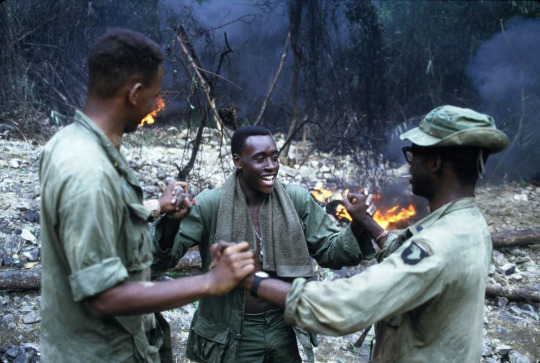
Thank you Hamburger Hill for providing us with actual footage of Rhodey’s first tour.
#HE'S SO TINY ADFGHJHGFDFGHJKL#he's so short#don was just 23 during this so when i say actual footage#also....#tony who was so worried he didnt sleep for a week: so how was your tour#rhodey trying not to think about how tall and hot everyone is: fine i was thinking of you the whole time :)#actually rhodey was just excited because he's! a! pilot! but still#don cheadle#james rhodes#rhodey#war machine#james rhodey rhodes#hamburger hill#iron patriot#iron man#marvel#mcu#tony stark
23 notes
·
View notes
Photo
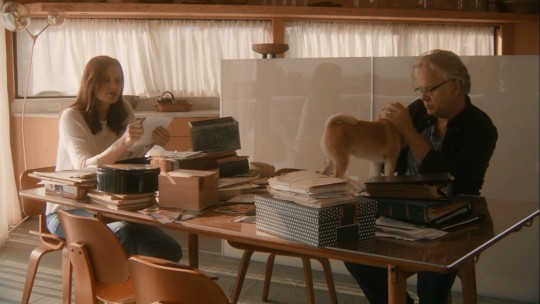
If you want to 'sell' me a drama...it better include moments of levity.
-
-
-
-
-
-
(Hopefully by this point you’ve finished all 99 minutes of ‘Marjorie Prime’, the kind of person who isn’t bothered by spoilers, or are just deciding if you still want to keep watching.)
-
-
-
-
-
It was that first scene that made all the difference. I read the blurb (which I rarely do...but...it was there before I clicked play...compared to if I was watching on Netflix. On Netflix I might just jump right to an interaction scene...and decide if it was the film for me.
For this one...I think it saved me from finding an interaction scene...because that's what it opens with. Unfortunately...the film does stumble a bit, I found sections where the editing was weird (the transition from one scene to another was distracting).
If I turned to my memories of Don Draper...I would probably consider him possibly...close to an AI. Which I thought was interesting given his arc within the show.
(Have you seen all episodes of 'Mad Men'? Let me know if you remember instances of Don...relaxed...and laughing unguarded. I know there's that amusing scene of Peggy showing her ability to make the most of having the upper hand when Roger requests something that needs to be done at a certain time)
In a way Walter Prime has an earnestness similar to the AI's in 'Her'. Though maybe not the kind of drive to find out who he is...separate from his purpose (since he is in a sense...a representation of someone's life....but also somehow...an individual)
PS: Having recently re-watched 'Felicity', I found myself paying close attention during scenes when characters received advice (Noel from his therapist, Felicity with both her guidance counsellors, Sally's reply to Felicity) and when characters share an epiphany (Ben in the Sean's documentary footage). This also happened when I was watching episodes of 'Addicted Australia'. Though I wasn't going through the exact situation as the participants...I could see how I could apply (to prevent things getting out of hand in my own life --- and recognise an addiction as soon as possible) or get myself pondering if what I need to be...
So in a way...even if the film wasn't as compelling as Season 1 and 2 of 'Better Call Saul' or four seasons of 'Rectify'...I was nudged towards action. I know there are those who turn to film as an escape from the realities they face...and this is the opposite for me: I'm looking for inspiration to help me be a better human. This might be as small as an idea for a new essay...or as big as a life change that I didn't know that I had to make.
PPS: What makes this an 'Art House' film? Well...there is no antagonist or protagonist. I thought it's actually Jon...but then there was an absence of a climax (which makes it easier to identify the two).
PPPS: I like how they opted to cast an older actor rather than ‘age’ Tim Robbins
--------
HIGHLIGHT:
INT. TESS AND JON'S HOME (LOUNGE ROOM) - NIGHT
Pouring rain outside the floor to ceiling windows of the contemporary (yet minimalist) home. MARJORIE PRIME is on the lounge while TESS is being absorbed by one of the arm chairs.
MARJORIE PRIME
Why don't you tell me more about myself.
TESS
Toward the end, you were self-conscious about your teeth.
MARJORIE PRIME
I'm vain?
TESS
A little.
She nods slowly.
MARJORIE PRIME
That's helpful.
TESS
You had a temper.
MARJORIE PRIME
I sound wonderful.
This bit of caustic humour doesn't really go well. TESS has that faraway look.
MARJORIE PRIME
Do I have other children besides you?
TESS
No, just me.
MARJORIE PRIME
What a lot of pressure for you.
A beat.
MARJORIE PRIME
Did I say something wrong?
TESS
No, you didn't.
MARJORIE PRIME
You were saying: just you.
TESS sits up straighter.
TESS
You also have a granddaughter named Raina. She's 23. She's in a band.
MARJORIE PRIME
She's musical, like me.
TESS
Raina doesn't talk to me. Her therapist said it would be better for now. Someone I've never met has advised my daughter not to talk to me. So, she calls Jon and he fills me in. It's humiliating.
MARJORIE PRIME
She's 23. Give her room. She'll work through it.
TESS
Now you sound like Jon.
MARJORIE PRIME
Yes.
The AI switches back to its programming.
MARJORIE PRIME
You haven't finished telling me what I’m like.
TESS
Well, you certainly wouldn't stand for your daughter giving you the silent treatment.
The show must go on.
TESS
You were a violinist. You were better than good. You were better at the violin than I am at anything. But when you couldn't play anymore from arthritis....
She raises her left hand to that familiar crook of the fingers. Giving us a clue that she attempted to tackle the violin at some point.
TESS
...you just seemed to leave it behind. We were all surprised that you could just...
--------
My verdict of the film: 5/10
Link to the timestamp commentary: None (Maybe if there are requests...)
A Formal Review: Only by request
More of my comments about the film: No plans (unless requested)
#Film#Marjorie Prime#Art House#Arthouse#Drama#Science Fiction#Michael Almereyda#Stage To Screen#Jordan Harrison#Geena Davis#Hannah Gross#Jon Hamm#Hana Colley#Lois Smith#Azumi Tsutsui#Bill Walters#Stephanie Andujar#Mica Levi#Shiba Inu#Aging#Dementia#AI#Artificial Intelligence
2 notes
·
View notes
Photo
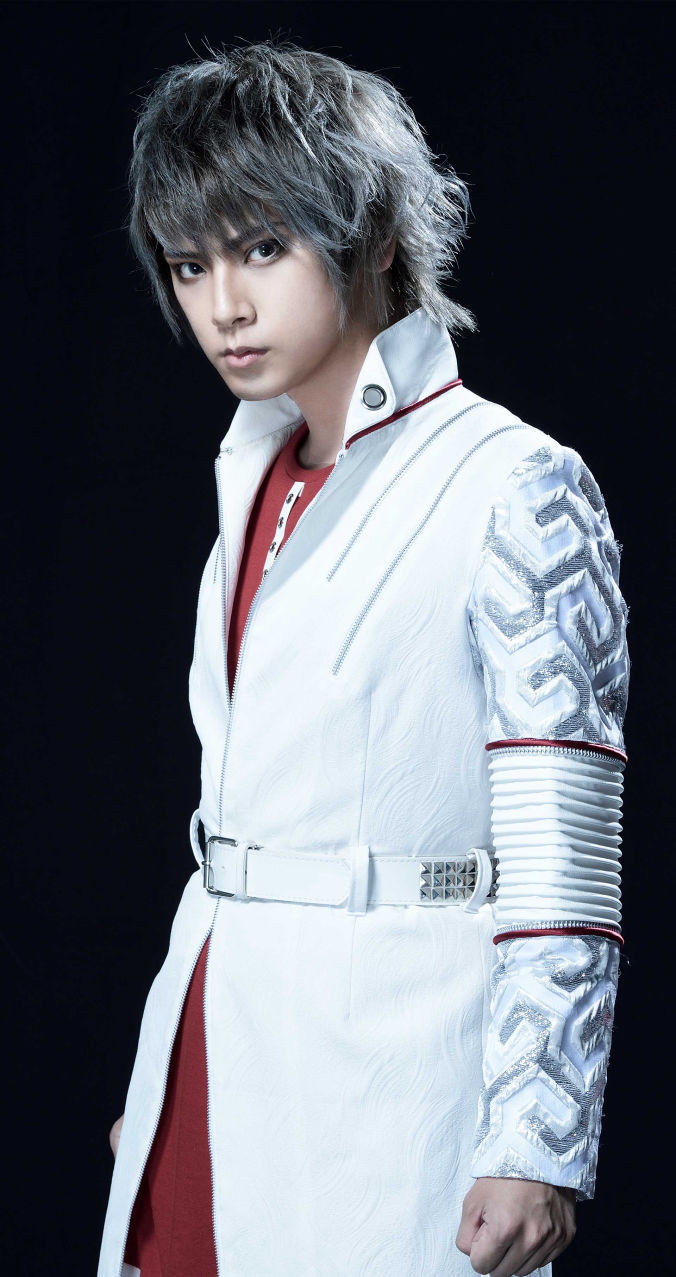


KSB member spotlight: Yamagata Yuuki
The next person on our spotlight is none other than *drum roll* the one and only Yamagata Yuuki aka The Fallen Angel!
Born on 12 October 1996, the Tsubaki member, whose youthful heart harbours a spirit to take the world in his hands, hails from the Kanagawa prefecture of Japan.
Donned in a white coat and with his signature ash coloured hair, Yamagata shines on stage without fail with his very skilfully coordinated dance moves and a level of energy that lightens up the theatre. That's just what we expect from someone who has been performing ever since the age of 14!
With KSB
A fan of rock and Visual Kei, Yamagata proudly aims for the "Sexy and heavy" Samurai image as a KSB member.
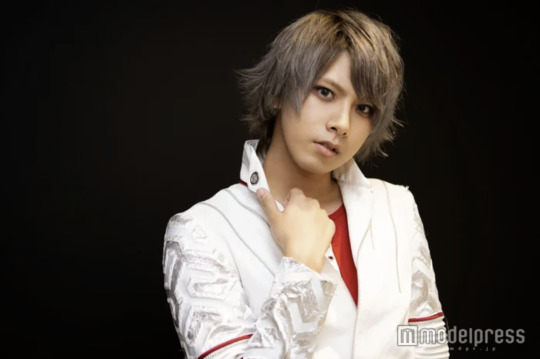
Are you ladies ready? Photo source
He lives up to that proclamation with his unforgettable screamo for the track Samurai Brotherhood. The screamo didn't make it into their debut CD, which makes all the live footage even more precious.

Wanna hear instead of just watching? Watch full video here
Dancing
Yamagata's dancing might not be the sharpest in Tsubaki, especially compared to the leader Fukuzawa Yuu, but there is just something that makes the 23-year-old truly able to remain in the viewers' eyes: his control of the flow of energy is very good. It feels like water when he dances, and while it is so natural, it also feels like he is telling a story with his whole body. He makes full use of every part up to his fingertips, and that gives the impression of not just hard training alone, but also incredible natural talent and passion mixed in. His stage presence is definitely there, or at least it has been getting better ever since the KSB boys debuted.
Singing
Yamagata reveals that he sang in bands and has been wanting to have an album ever since high school (which is why he truly was happy when KSB's debut album was released). He absolutely has the voice and look of an idol, his voice is pleasant, lies in the high range and as we can see from live performance footage, he can even do death vocals - which is not something commonly seen in the pop idol scene. Not to mention, he comes back to sing in his normal voice right after the screamo every time!
Personality
Having been vocalists in Visual Kei bands ever since his teenage years, the young Samurai Boy brings his love for rock everywhere he goes. He shows it in his outfits and the way he performs live as a KSB member.
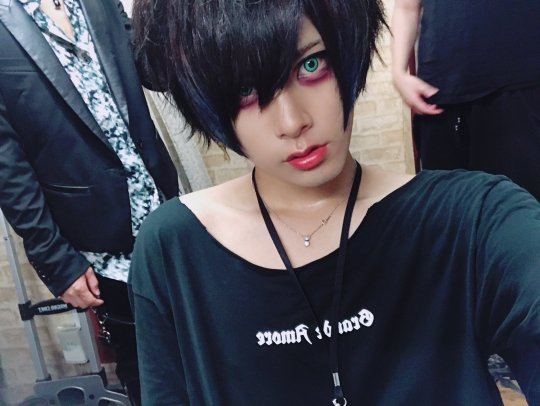
Photo source
He reiterates his love for rock and rock/Visual Kei idols numerous times in interviews.
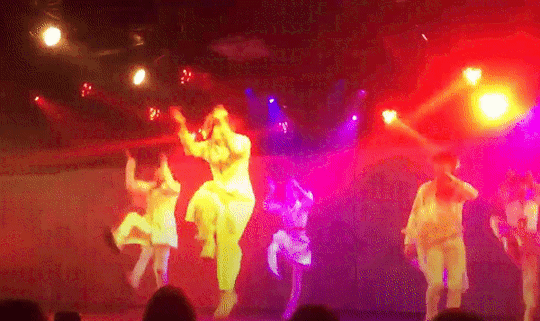
Yamagata is actually very lively and bright in normal daily activities, as contrast to the style of his darker, gothic side. He gives off the air of someone who wants to live his self the way he wants, without caring much about what others think of him.

He is actually quite close with Tsubaki's leader Fukuzawa Yuu. i mean, the latter knows exactly who to count on when he wishes to give everyone a good time
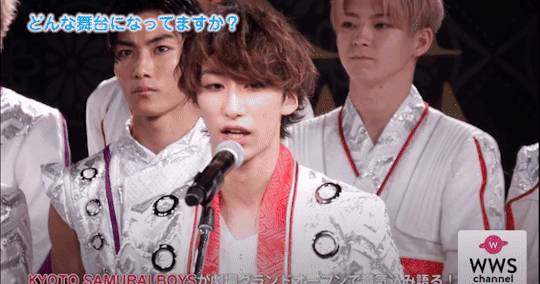
Source
Acting and DMMD Stage
It would not be a far stretch to say that Yamagata shot to stage fame after his role as Clear in the DMMD stage play in December 2019. Though he has had numerous experience before, he stated DMMD was the first stage with spoken lines which he has been starred in.
It was not a surprise to see the praises he gained as Clear, for he earned every word of it. As someone who adores Clear and wasn't sure what to think of the stage play when its promotional materials first came out, i truly feel grateful that it is Yamagata who played this character. Yamagata's Clear could just be wrapped up with one word: Adorable

i mean would you look at that?
Using his dance talent to his advantage, he improvised some of his dance parts (he revealed this in the last curtain call of Clear's route), which pleasantly surprised theatre goers who watched the same route multiple times. His acting as Clear never felt forced even though the character is quite complex. The last dance he performed when Clear is supposed to be back after a long time, gave me so much emotion just by looking at his elegant moves. He pulled off the way Clear moves and speaks, while always injecting some of his true bubbly self in. One could even say, it is Yamagata who plays Clear, because Yamagata himself is just like Clear, or more accurately, because Yamagata made himself a version of Clear.
Even though he gained quite a following from his role as Clear (he even gained a nickname for himself, i.e Yamagata Clear, cementing his place in the DMMD fandom and more specifically DMMD Clear fandom), the youth hopes that people who got to know him from the play, will eventually look at him not just as Yamagata Clear, but also as Yamagata Yuuki, as well as as a Kyoto Samurai Boy. He urged his fans on Twitter to check out KSB's latest contents, which unfortunately didn't feature him, but nevertheless would be addicting for anyone at all. (i personally recommend checking them out too)
Trivia
His KSB number 69 is a word play on the word "ROCK": 6 is "roku" and 9 is "kyu" (and in certain cases, "ku") in Japanese, together they are "rokku", or ROCK
One of his hobbies listed by Modelpress is cosplaying. Source
He likes to bring KSB members to try a drink he called the "Forbidden Fruit" (together with an ice cream dish numbered 69 aka his KSB number, which he called the Fallen Angel’s Serenade) at a cafe who has been collaborating with the KSB project, and during one of such visits we get to see one of the adorable moments of the Tsubaki boys
It is shown he has had various hair dye colours in the last couple of years, including red, white, blonde, and the current ash.
His catchphrase is やる気!元気!悠己! - "Yaruki! Genki! Yuuki!" (Can be roughly translated as Enthusiasm! Strength! Yuuki!)
During an interview, he said if he could be a girl for one day only, he'd cruise around Roppongi on a limousine with a glass of champaign, and have a girls' night out with other ladies. Source
During the DMMD stage play period as Clear, he was not permitted to show his face online, so he always covered his face when being in photos on Twitter. He showed his Clear face on Twitter on Christmas Eve as a gift to fans.
Yamagata is also shown to be quite close with the other leaders, Wakaba’s Yasue and Kikyo’s Masa. Masa wrote a calligraphy for him as present to celebrate DMMD stage getting a streaming. Yamagata went to see Masa’s performance in the Mankai A3 Stage
How do you think about the Fallen Angel of KSB? This boy may still be finding his way to achieve his dreams, but i just can't wait to see him grow and get more opportunities in the near future! Be sure to check out his Twitter! (Unfortunately at the point of this writing, Yamagata has yet to create an Instagram account, but you can still search for tags with his name)
9 notes
·
View notes
Text
'The Last Dance' proves why Michael Jordan's the only athlete who could ever be loved as both hero and villain - CBS Sports
New Post has been published on https://newsprofixpro.com/moxie/2020/05/12/the-last-dance-proves-why-michael-jordans-the-only-athlete-who-could-ever-be-loved-as-both-hero-and-villain-cbs-sports/
'The Last Dance' proves why Michael Jordan's the only athlete who could ever be loved as both hero and villain - CBS Sports
The greatest trick Michael Jordan ever pulled was becoming a villain right in front of our eyes — and looking like a hero while doing it. That’s the essence of what has to be acknowledged as the most enjoyable and enlightening Jordan interview excerpt we’ve seen so far from “The Last Dance,” which is now eight episodes deep into its 10-episode run. On Sunday night, millions saw the clip that’s going to birth two or three more everlasting M.J. memes. The Gary Payton reaction clip. Near the end of Episode 8, director Jason Hehir once more pulls a move that has served this documentary-as-cultural-event so well. Hehir hands Jordan a tablet for him to watch interview subjects speak about him, in the present day, with Jordan getting the benefit of being afforded a last word on whomever it is he’s provided to roast or rebel against. I am here to tell you that Michael Jordan reacting to Gary Payton talking about Michael Jordan is as pure a look into the mind of M.J. as you’ll ever get of the man — at least away from his greatness and killer instinct so often laid bare on the basketball court.
Payton is one of the best defenders in NBA history. He was as good of a trashtalker as Jordan could claim to be, and in fact Payton did a great job guarding and harassing 23 in the ’96 Finals. Payton was the Defensive Player of the Year in 1995-96, and he helped Seattle sidestep infamy by dodging a presumed sweep at the hands of the 72-win Bulls. Loaded up alongside Shawn Kemp, Payton and the Sonics worked to a respectable six-game defeat. Like more than 100 other interview subjects, Payton agreed to have a chat, to reminisce on his team getting worked by Chicago. He could have said a few platitudes, offered up a nice quip of a quote and been done with it. But that’s not the Glove’s style. And so it had to come to this. On Sunday night, Jordan took off the cape, donned a proverbial villain’s mask and ended Payton. There is no coming back from this. Whichever reporters wind up tracking down Payton for a follow-up, well, that will be forgotten about almost immediately anyway. This video is what makes Jordan, and this documentary, so irresistible. You’ve got Payton being so damn sure of himself, saying things would have been different if he guarded Jordan from the outset. Jordan can’t wait for this. The cackling. The big eyes, the raised brow. Jordan busts a gut again when Payton says, “It was a difference with beating him down a little bit.” Then, a beat to take it all in. “The Glove,” Jordan says. Oh, it almost sounds reverential for just a second there. The Glove. One of his contemporaries during the golden years of the NBA.
“I had no problem with the Glove.” As smooth as it is savage in delivery. Like Jordan forgot about this man for two decades before needing to be handed a tablet to remind him of who he played against in June of 1996. Jordan in fact averaged 27.3 points on 41.5 percent shooting against Seattle. It was indisputably his worst Finals; it’s the only time he failed to average north of 30 points and shot worse than 45 percent. Payton does have a case. But the Bulls won the series in six and Jordan was the MVP. That’s all anyone remembers or cares about. The 1995-96 Bulls culminated the most dominant wire-to-wire season in NBA history by winning a championship in Jordan’s first full season back in the league. That’s the legacy, and it’s really what sets the table for the 1997-98 doc to even happen anyway. But that clip is so telling. Of Jordan, but also of us. It’s compelling as hell. Jordan comes off looking like some sort of unhinged supervillain — and we like him even more because of it. He’s laughing at roadkill 24 years in his rearview. With the hand-back of a tablet, Gary Payton and SuperSonics are disposed of. It is affable arrogance, and there isn’t another athlete alive today who can pull it off. Watch it again; you know you want to. Jordan looks more villainesque than at any other point during Episodes 7 and 8, which is notable because Sunday night was supposed to be the night we had to reckon with Jordan’s abusive behavior to teammates. These two episodes were to be what made us feel uncomfortable about all the praise from the prior six. These were supposed to be the two episodes that humanized — and villainized — the greatest basketball player in history.
Instead, the documentary continued to blast Jordan’s legend and likability beyond the stratosphere. Buzzed-about behind-the-scenes footage of Jordan picking fights with (or just plain picking on) teammates were practically muted compared to legends of his alleged abusive behavior. We predictably saw him rag on Scott Burrell and yes, we got firsthand accounts from both Jordan and Steve Kerr recalling when Jordan took a closed right fist directly into Kerr’s eye socket. But even that long-established anecdote was wrapped with a bow on the doc with Kerr proclaiming it was “the best thing I ever did” to further his career and push the Bulls closer together in the infancy of that historic 1995-96 season. Sunday night brought into focus the murder of Jordan’s father, James, and how that set into motion his earth-stopping retirement in the fall of 1993. We learned two things from Jordan in Episode 7: that when the Bulls won the ’93 title, his dad was the only one who really knew he was planning on retiring, and that the final conversation James and Michael Jordan ever had included a father telling his son to chase his dream of playing baseball. James Jordan was next to Michael after the Bulls’ championship-winning nights in 1991, 1992 and 1993. He’s in the photos, soaked in celebration, sitting or standing beside his son in celebration.
This was juxtaposed against Jordan’s beloved villainy, which was laid out in his sociopathic motivations. Inventing grudges or actions that pushed him to new levels of vengefulness. But the devil of it all is that Jordan balances this by showing how human and fragile he can be. He cares so much, his joy for killing his competition so genuine, that emotion is a finality for every ending in 1991, 1992, 1993, 1996, 1997 and 1998. Each time is catharsis. And it never seems staged, forced or fake. That’s why this documentary is reeling millions in. Jordan gave a damn more than anyone ever gave a damn and losing was death. The end of Episode 8 brings around that ever-familiar image of a stretched-out Jordan on his stomach, in Chicago, crying in solitude after winning Game 6 against Seattle. His father’s been dead for almost three years. You’ve seen this video tens if not hundreds if not thousands of times. But did you ever actually hear it? On Sunday, yes. You can hear the heaves, hear the expulsion of misery and regret, the outpouring of joy and emission of probably three or four other types of emotions that Jordan himself would have trouble articulating to this day. That coming at the end of Episode 8 wraps a ribbon around the even more powerful conclusion to Episode 7, where again we see Jordan as villain as much as we do as hero. But instead of being animated in a comical way, he’s the most emotional we’ve seen him so far in this doc. What a moment. And just before that clip, Jordan’s most intense, clear-eyed quote of this entire thing: “You ask all my teammates? The one thing about Michael Jordan was: He never asked me to do something that he didn’t f—–g do.”
That’s power, that’s intimidation and that’s 100 percent accurate. He was the hero and he was the villain and he was everything you wanted him to be while being nothing no one else could ever be.
Read More
0 notes